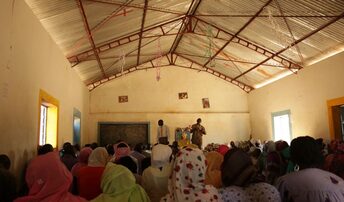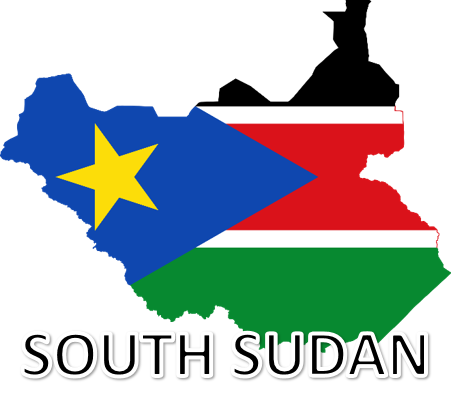 The first Sudanese to be converted to Christ was the treasurer of Queen Candace in AD 37 (Acts 8:26-40). Meroe During the 3rd Century many Egyptian Christians fled to Sudan during the persecutions of the Roman emperors Decius (AD 250) and Diocletian (AD 297). A strong Christian community was flourishing in Philae from at least AD 350. Crosses and other Christian objects have been found in the royal tombs of Meroe dating back to the 5th Century. Nubia, Makuria and Alwa
Following the collapse of the Kingdom of Meroe (in about AD 350) three smaller Kingdoms were established - Nubia, Makuria and Alwa. The middle kingdom of Makuria was converted after the missionary work of Julian. One early writer described the conversion of the Nubian king, Bahriya, as the key event: "When Bahriya was converted to the religion of Christ, all the Blacks of Nubia followed him, and he built for them churches throughout the land of Nubia and many monasteries which are still flourishing." Flourishing Faith By AD 580 Christianity had become the official religion of the kingdom of Nubia. Many thousands became monks. Archaeologists have unearthed over a hundred churches dating back to this period in Nubia. Many of these churches have elaborate paintings on the walls. Islamic offensives Repulsed After the death of Muhammad in AD 632 the peaceful growth of the Churches in the Nile valley was shattered. Arab armies rapidly spread out throughout the Middle East. Egypt was conquered in AD 642. The Islamic armies then launched an attack on Nubia in AD 643. The Nubians steadfastly resisted and threw back the invaders. Again in AD 652 a Muslim military expedition sought to conquer Nubia. Again they were defeated by the Nubians. After their military failures the Muslims entered into an agreement called the Baqtwhich established peaceful relations and trade between Muslim Egypt and Christian Nubia. The peace lasted almost 600 years until about AD 1250. The Triumph of the Cross From AD 900 to 1200 Nubia enjoyed a golden age of peace, prosperity and Church growth. One of the popular hymns still sung today was composed at that time: "The Cross is the hope of the Christians; The Cross is the resurrection of the dead; The Cross is the path of them who wandered; The Cross is the guidance of the blind, The Cross is the staff of the lame; The Cross is the nurse of the suckling; The Cross is what strengthens the feeble; The Cross is the physician of the sick; The Cross is the perfection of the priests." Islamic Threat Intensifies In AD 1172 the Fatimid rulers in Egypt (who upheld the Baqt agreement) were overthrown by Saladin. Then in 1260 another revolution in Egypt brought the Mamelukes to power. The Mamelukes then waged a series of wars against the Nubians. Towns were burnt and confusion spread. Gradually the weakened kingdom fell into chaos and under the control of the Mamelukes. The kingdom of Dotawo started to break up over the next 150 years. The last Christian king, Joel, fell in 1484. Alwa Isolated The southernmost Christian kingdom of Alwa survived successive attacks in the 14th and 15th centuries. In 1450 a missionary to Ethiopia wrote this about Nubia: "The people are neither Christians, Muslims or, Jews, but they live in the desire of being Christians."The recorded history indicates that very few Nubians converted to Islam. Christianity began to die out because of internal weaknesses in the Churches and not because of the external attacks of Islam. A Cry for Help The missionary Avares wrote of Sudanese who came to Ethiopia from Alwa: "While we were in (Ethiopia) there came six men from (Alwa) as Ambassadors to the King, begging him to send them ministers and monks to teach them. He did not choose to send them."This was the last we heard of the Church in Northern Sudan. An island of Christianity in a sea of Islam, isolated and cut off - they appealed to their Christian neighbours in Ethiopia. Tragically, this help was refused. Catholic Missions to Sudan By the 1600's word reached Rome of groups of Christians surviving South of the Sahara. The pope set up the "Mission of Upper Egypt-Funji-Ethiopia" and several missions (in 1698, 1705 and 1711) were sent up the Nile to make contact with the believers. The final attempt in 1794 ended with Father Ballerini being murdered in Nubia. From 1849 the Catholics established a string of mission stations - in Khartoum, Yondokoro, Kanisa, Kakor and elsewhere. Forty-six missionaries died of disease in the first few years. In 1862 alone, 22 missionaries died. Finally all the mission stations were abandoned and the survivors returned to Europe. A new Catholic attempt to reach Sudan was launched in 1873 with schools and farms as the priority. This strategy succeeded and today almost half of those who claim to be Christians in Sudan are Catholics. Protestant Missions In 1885 after the fall of Khartoum and the beheading of General Gordon, the Church Missionary Society raised funds for a mission to Sudan in honour of General Gordon's pioneer work and witness. They were followed by the United Presbyterian Church of America and later the Sudan Interior Mission and Africa Inland Mission. Hospitals and schools became the focal points of the new Protestant missions. Revivals and Bible Translations Revivals broke out in Yambio and Mundri County in 1938. Bible translations into Bari, Zande, Moru, Acholi, Dinka and Nuer continued from the 1930's to the 1970's and to this day. So far, 11 languages have full Bibles, 23 have only New Testaments and 35 have only portions of the Bible translated. Islamisation In 1957 the Muslim government seized control of all the mission schools. In 1960 Sunday was replaced by Friday as the day of rest. Those who protested were imprisoned for years. Khalwas (Islamic schools) were built throughout the South. Their ruins are still a reminder of how much they were resented. In 1962 The Missionary Societies Act attempted to restrict missionary work by forbidding evangelism of those under 18 years old. In 1964 all missionaries were expelled and persecution intensified. Resistance and Growth Yet the Church has increased tenfold over the last 40 years. Today the steadfast and resilient Christian Church in South Sudan is one of the fastest growing in the world. Dr. Peter Hammond Frontline Fellowship P.O. Box 74 Newlands 7725 Cape Town South Africa Tel: 021-689-4480 Email: [email protected]
2 Comments
Sonia
17/9/2018 12:56:45
This was new and interesting information. I was born and brought up in Sudan
Reply
Fr. David Brown
31/8/2022 03:59:41
I will visit S. Sudan next year. I hope to drill fresh water
Reply
Leave a Reply. |
More Articles
All
Archives
July 2021
|
"And Jesus came and spoke to them, saying, “All authority has been given to Me in heaven and on earth.
Go therefore and make disciples of all the nations, baptizing them in the name of the Father and of the Son and of the Holy Spirit,
teaching them to observe all things that I have commanded you; and lo, I am with you always, even to the end of the age.” Amen.” Matthew 28: 18-20
Go therefore and make disciples of all the nations, baptizing them in the name of the Father and of the Son and of the Holy Spirit,
teaching them to observe all things that I have commanded you; and lo, I am with you always, even to the end of the age.” Amen.” Matthew 28: 18-20
|
P.O.Box 74 Newlands 7725
Cape Town South Africa |
|

 RSS Feed
RSS Feed
